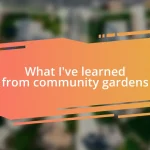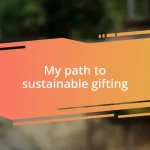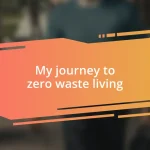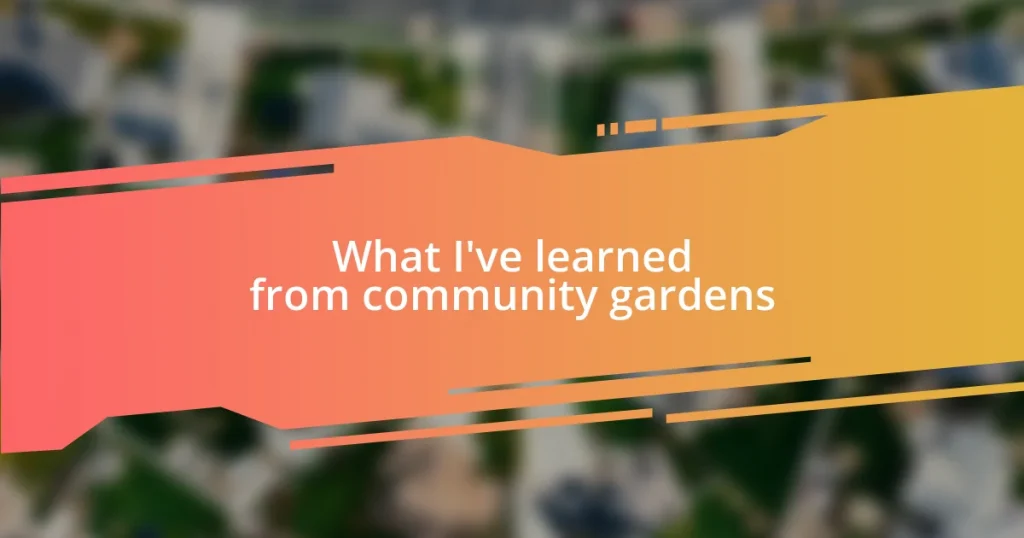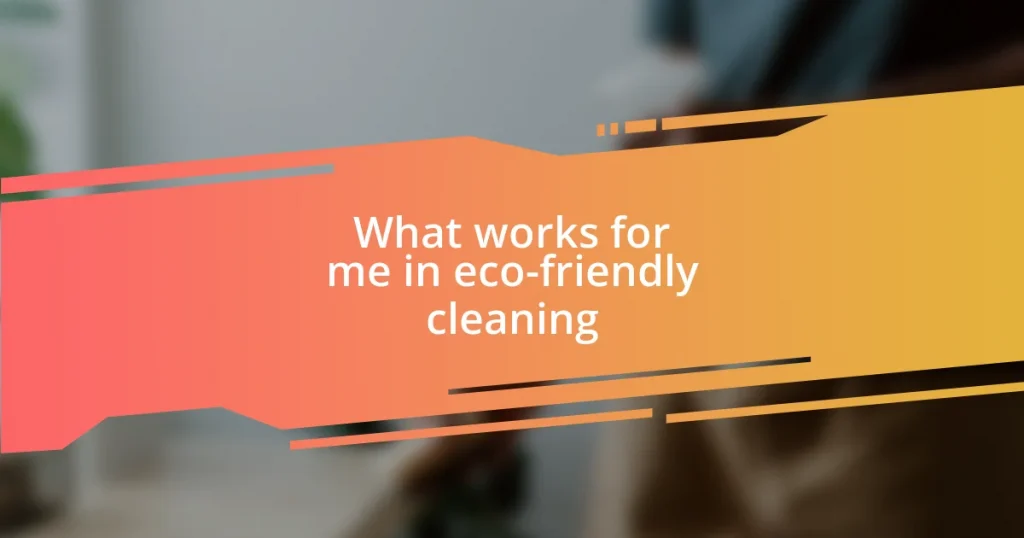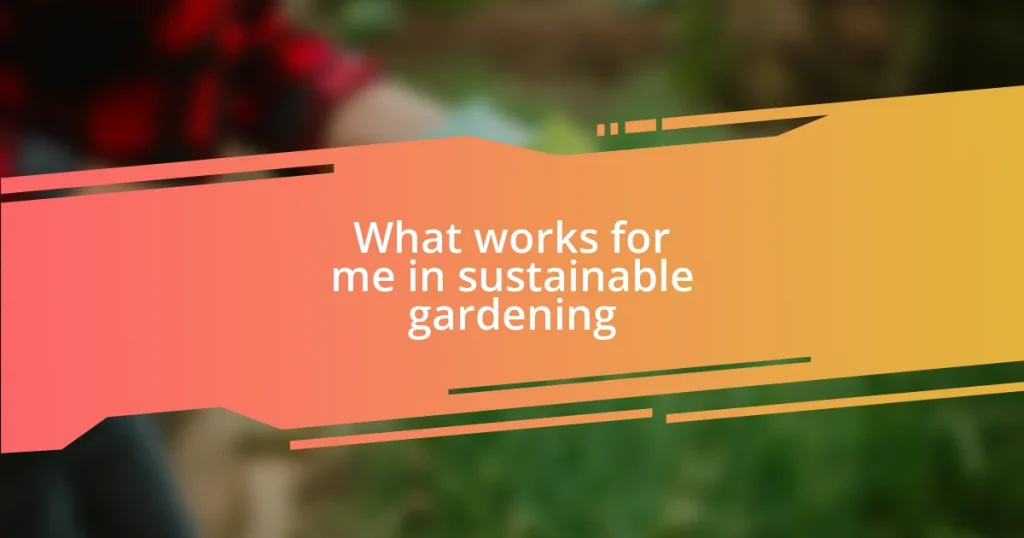Key takeaways:
- Community gardens foster social connections, offering a platform for friendships, skill-sharing, and local event organization.
- Engagement in gardening promotes environmental awareness, sustainability practices, and mental health benefits, acting as a therapeutic medium.
- Participating in community gardens enhances food security by growing produce for local food banks and adopting sustainable practices that benefit both the community and the planet.
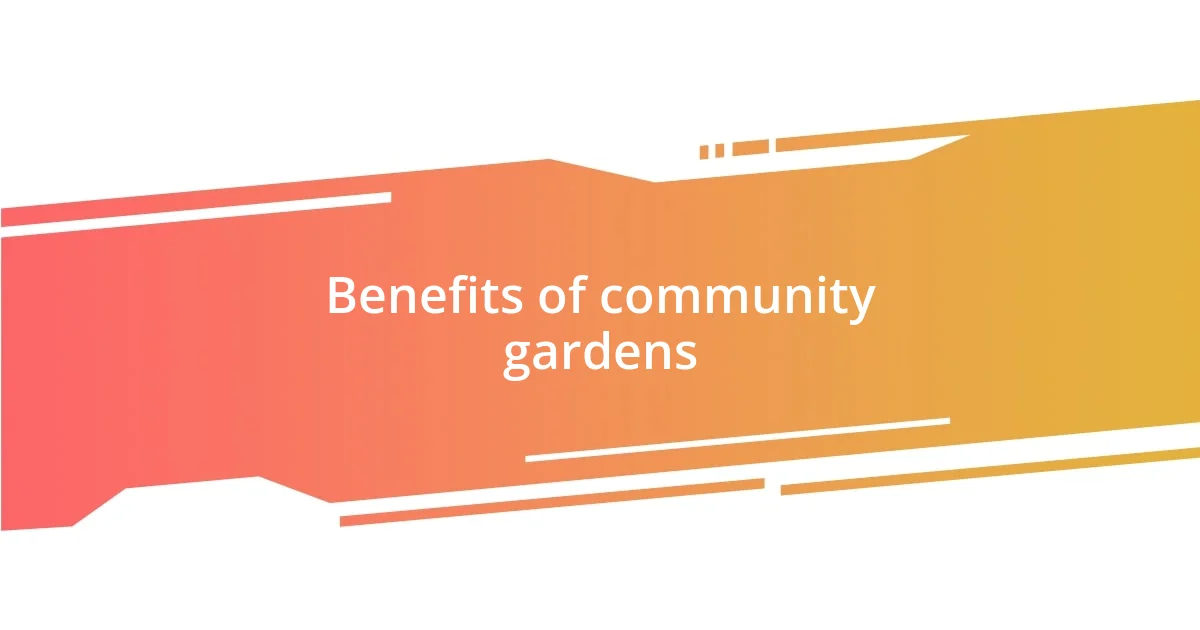
Benefits of community gardens
Community gardens offer a treasure trove of benefits that stretch beyond just growing food. I remember my first experience tending to a small plot in my neighborhood; it was a joy to see not only the seeds sprouting but friendships blossoming alongside them. Isn’t it fascinating how just a little bit of earth can bring people together, fostering a sense of belonging and collaboration?
Beyond social connections, community gardens are exceptional for promoting healthier lifestyles. When I started visiting the garden regularly, I discovered a whole new appreciation for fresh produce. Have you ever tasted a sun-ripened tomato right off the vine? There’s nothing quite like it, and I’ve found that these experiences often inspire a deeper commitment to healthy eating in the broader community.
Moreover, these green spaces can transform our urban landscapes, promoting environmental sustainability. I’ve seen firsthand how community gardens improve air quality and increase biodiversity in the city. Isn’t it incredible to think that cultivating a small patch of land can create a ripple effect, benefiting not just the gardeners but the environment and the community as a whole? There’s something truly powerful about being part of such positive change.
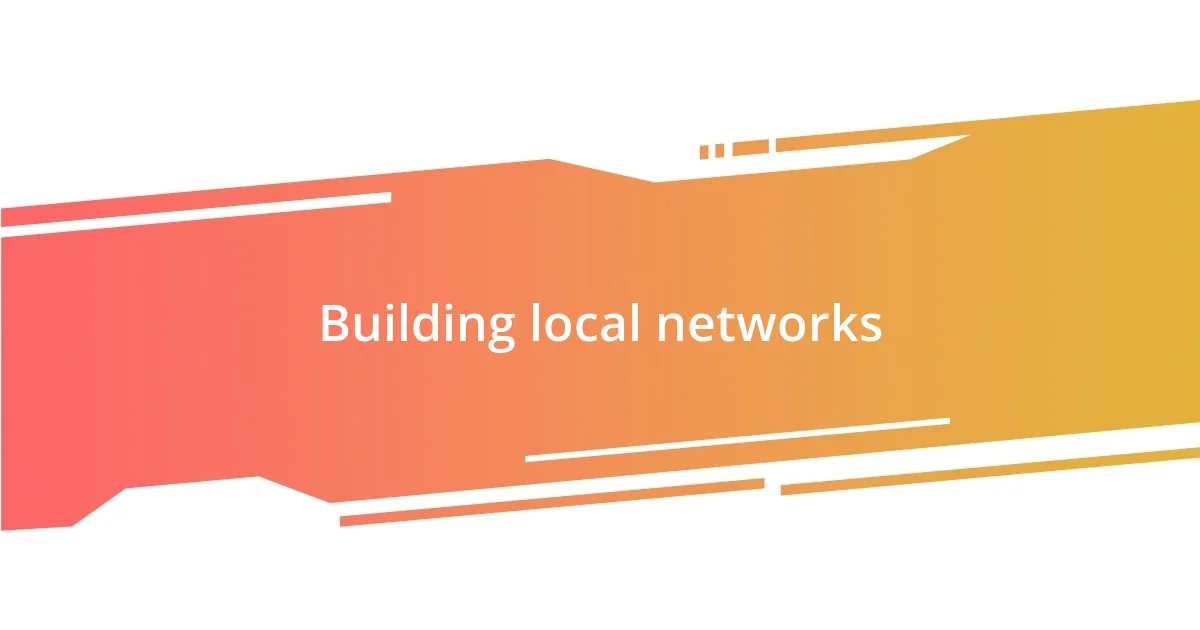
Building local networks
Building local networks through community gardens has been an eye-opening experience for me. One evening, as I sifted through soil, I struck up a conversation with a neighbor I had never met before. That simple exchange of stories over a shared love of gardening led to a friendship that has enriched both our lives. It’s amazing how these gardens serve as informal meeting grounds, where connections blossom just as much as the flowers and vegetables.
As I became more involved in my local garden, I noticed the diversity of people gathered there, each bringing a unique perspective. I remember a woman who introduced me to a new gardening technique that revolutionized how I cultivated my plot. These skill-sharing moments strengthen the community bond, and it feels wonderful to collaborate with others while expanding my knowledge. Who knew that growing tomatoes could also grow friendships and networks?
I’ve also observed how these local networks extend beyond the garden. When planning a community event last summer, several of us coordinated effortlessly, drawing on the relationships we’ve built. I can’t help but reflect: how often do we find ourselves in such supportive spaces? The collaboration within community gardens fosters a sense of trust and camaraderie, ultimately enriching our lives in the neighborhood.
| Aspect | Community Gardens |
|---|---|
| Social Connections | Foster friendships and networking opportunities |
| Skill Sharing | Promote learning new techniques and knowledge exchange |
| Community Events | Serve as a platform for organizing local initiatives |
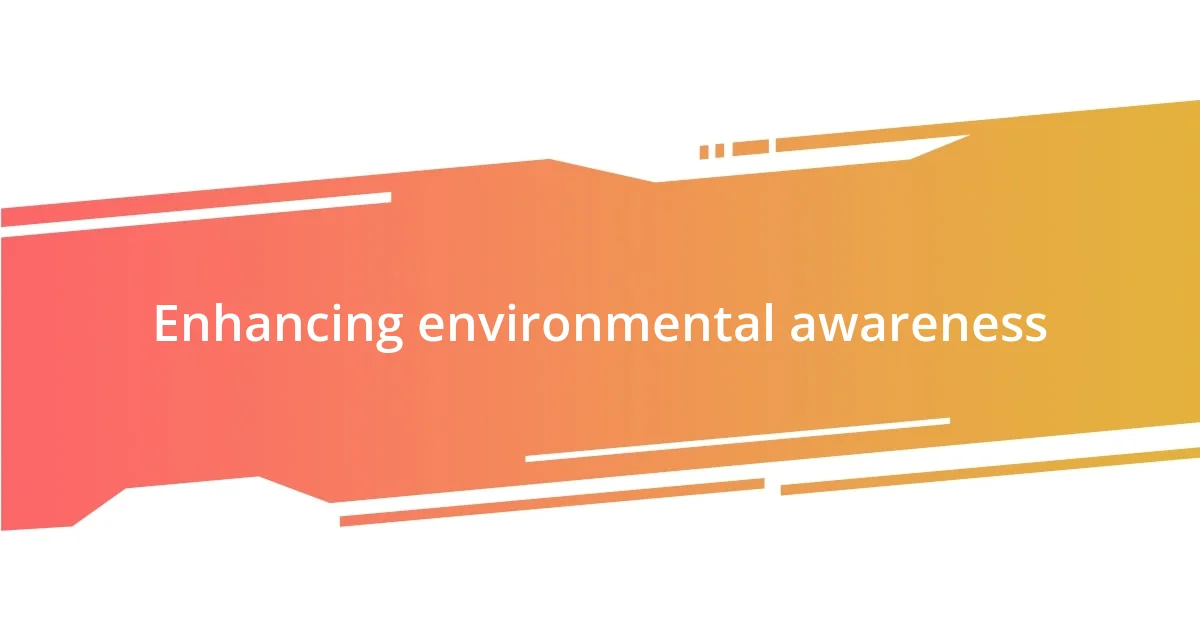
Enhancing environmental awareness
Community gardens have an incredible power to enhance environmental awareness among participants. My first real encounter with sustainable practices was while composting in my garden. Initially, I didn’t fully understand the impact of recycling kitchen scraps and yard waste, but witnessing the transformation into rich soil opened my eyes. It became clear to me that these gardens serve not only as growing spaces but as educational platforms for embracing eco-friendly habits.
- Biodiversity: I learned that planting native species attracts pollinators, directly contributing to a healthier ecosystem.
- Water Conservation: The use of rain barrels in our garden taught me the importance of capturing rainwater, reducing reliance on municipal sources.
- Pesticide Alternatives: I grew increasingly aware of the harmful effects of synthetic pesticides, and it was liberating to explore organic options that not only protect the plants but also the wildlife around us.
Engaging with the earth also shifted my perception of waste. I vividly remember those moments when I witnessed discarded materials repurposed into garden tools or decorations. These creative practices not only minimized waste but sparked discussions on sustainability, fostering a culture of environmental responsibility within our community. Embracing these lessons made me feel like an integral part of a movement that’s crucial for our planet’s future.
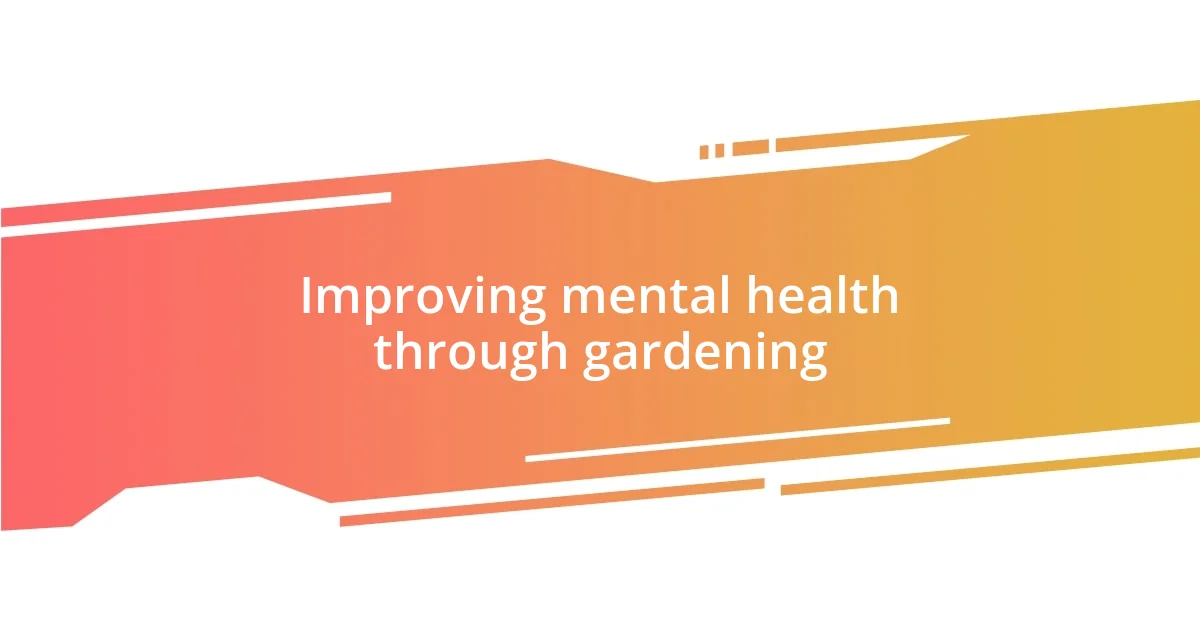
Improving mental health through gardening
Gardening has become my sanctuary for improving mental health. I remember a particularly stressful week at work when I turned to my garden, and the simple act of pulling weeds felt therapeutic. As I immersed myself in the earthy aroma and the rhythm of nature, I realized that gardening was more than just a hobby; it was my escape, where worries faded with each seed I planted.
There’s something almost magical about watching life flourish in a garden. I often lose track of time as I nurture my plants, and in those moments, I forget the anxieties that usually cloud my mind. It’s almost like a meditation, the way my hands dig into the soil, grounding me in the present. Have you ever felt that blissful connection to nature? This is why I consistently return to my garden—it whispers to my soul in a way that no other activity can.
Moreover, the vibrant community around my garden amplifies this mental health benefit. I recall chatting with an elderly man who shared how he uses gardening to cope with his loneliness. Hearing his story reminded me that gardening has the power to foster connections and lift spirits. It’s not just about the plants; it’s about the shared experiences and healing journeys that intertwine through soil and sweat. I believe that anyone seeking solace should try getting their hands dirty—it might just bring them the peace they’re searching for.
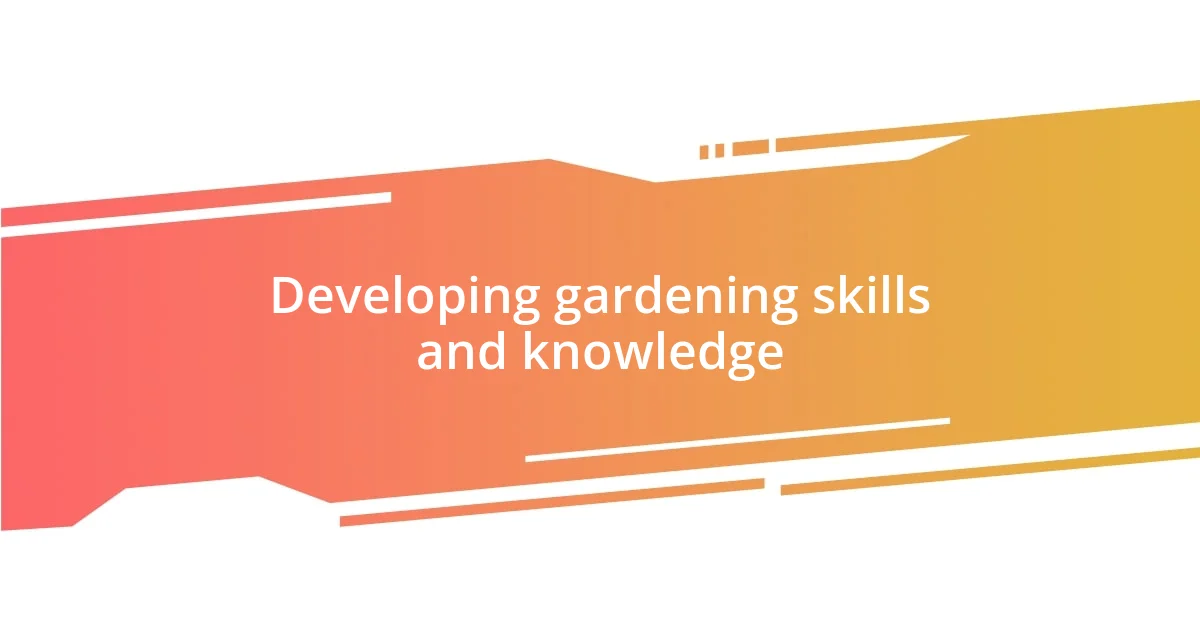
Developing gardening skills and knowledge
Developing gardening skills and knowledge in a community garden can be incredibly rewarding. I still remember the first time I successfully harvested tomatoes. The experience felt like unwrapping a carefully hidden gift; I had sown those seeds, nurtured them, and now here they were, vibrant and ripe. There’s a tangible satisfaction in gaining hands-on experience that no gardening book can replicate.
As I delved deeper into gardening, I stumbled upon the beneficial techniques that make plants thrive. For instance, learning about crop rotation opened my eyes to how it prevents soil depletion and pests. It’s fascinating to think that by simply changing where you plant certain crops each season, you can enhance the health of your garden dramatically. Why haven’t I ever thought of this before? This discovery sparked my curiosity and encouraged me to constantly seek new knowledge about plant health, soil types, and sustainable practices.
Connecting with seasoned gardeners was another game-changer for me. I vividly recall a workshop where a member shared tips on companion planting. I was amazed to learn that marigolds could repel certain pests, a simple method that’s not only effective but also adds a burst of color to the garden beds! Engaging with others nourished my passion and taught me that gardening is not just about individual growth, but a collective journey. Isn’t it inspiring how sharing knowledge can blossom into new skills and deeper connections within a community?
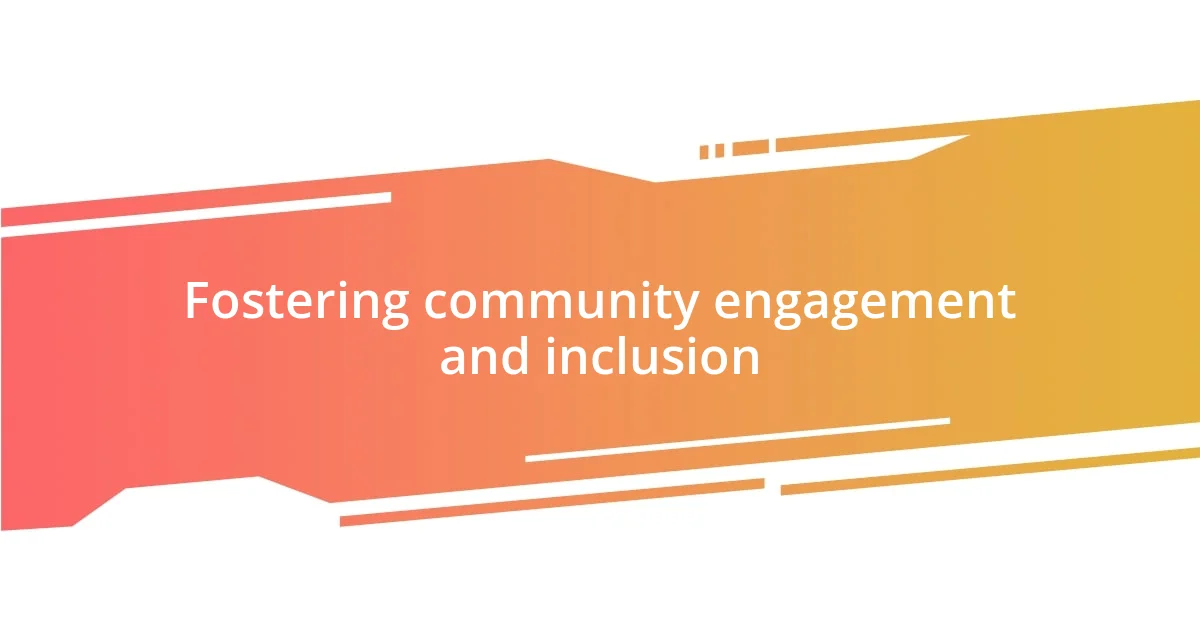
Fostering community engagement and inclusion
Community gardens are a beautiful melting pot of diverse backgrounds and experiences, and I can’t help but reflect on how this inclusion transforms a simple plot of land into a vibrant hub. I remember one sunny Saturday when our garden organized a potluck. Neighbors who had never spoken before shared recipes and exchanged stories while surrounded by the hard work of their collective efforts. It struck me just how powerful food and gardening can be in breaking down barriers and fostering real connections. Have you ever felt a sense of camaraderie bloom over shared meals and growth?
In engaging with various community members, I’ve learned that everyone brings something unique to the table—whether it’s wisdom, skills, or even just a hearty laugh. During my time at the garden, a young mother taught me how she uses gardening to bond with her children, turning weeding into a treasure hunt for interesting bugs. Watching her light up while sharing these moments made me realize that community gardens are not just for growing plants, but also for nurturing relationships and promoting intergenerational learning. How empowering is it to know we can plant seeds of friendship as easily as we plant seeds of vegetables?
In my experience, the sense of belonging in a community garden offers psychological safety and warmth, inviting everyone to participate regardless of their background. I remember when a newcomer hesitated to join in, unsure of their gardening knowledge. After a few friendly chats, they not only became a regular but also introduced us to an entirely new planting technique they learned in another country. That moment of inclusion sparked a ripple of excitement and curiosity—showing me that when we foster an environment of openness, everyone can thrive together. Isn’t it remarkable how every gardener, no matter their experience level, has the potential to contribute to our collective growth?
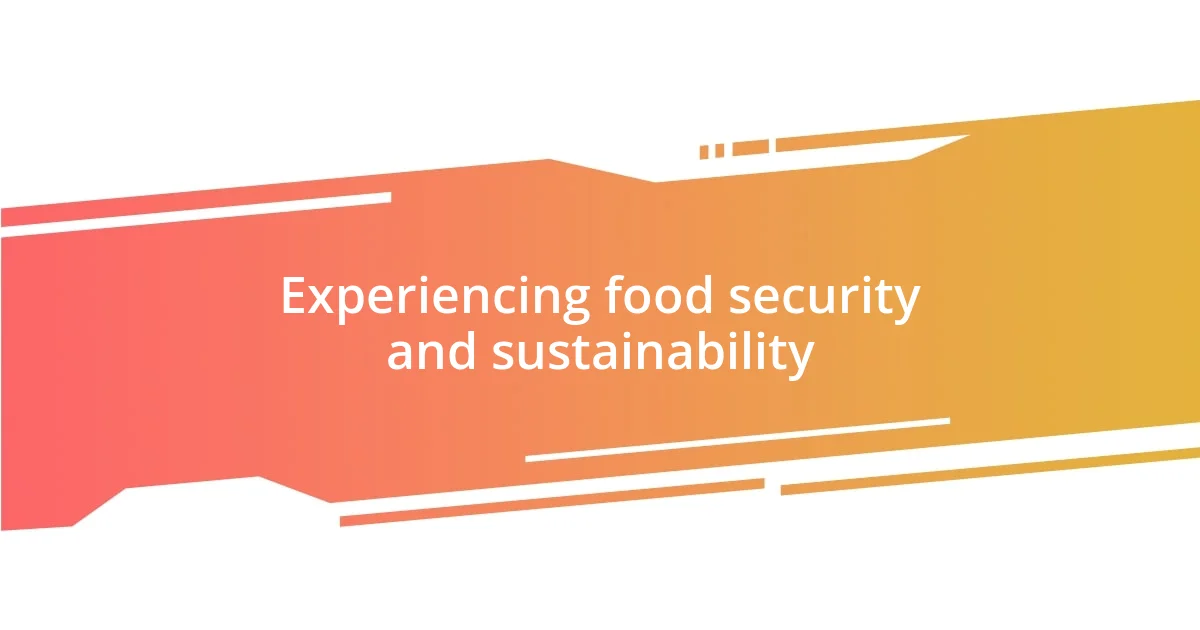
Experiencing food security and sustainability
Food security and sustainability felt profoundly personal during my time in the community garden. I vividly recall one season when we decided to plant extra rows of leafy greens, aiming not just for our families but also for local food banks. Watching those kale and spinach leaves flourish gave me a deep sense of purpose; we were cultivating more than just plants—we were nurturing hope for those in need. Isn’t it rewarding to think that our collective efforts could help feed families struggling to put food on the table?
I’ve come to appreciate how utilizing sustainable practices in our gardening directly aligns with food security. One day, a fellow gardener shared her approach to using rainwater collection systems, and I was amazed to see how efficiently we could conserve resources while feeding the garden. It made me wonder: how many more simple techniques like this could we adopt if we truly embraced sustainability? These experiences opened my eyes to the power of eco-conscious choices that don’t just benefit our immediate needs but contribute to the health of our planet as well.
Over time, I’ve felt a growing bond with the earth and my community as we champion sustainable practices together. Participating in workshops on composting shifted my perspective entirely—seeing food waste transformed into nutrient-rich soil felt like magic. This transformation taught me that sustainability isn’t merely a concept but a lifestyle choice that we can all adopt, ensuring that our gardening endeavors can flourish for generations to come. Have you ever thought about the long-term impact of your gardening choices? It’s a question that continuously inspires me in my journey.
